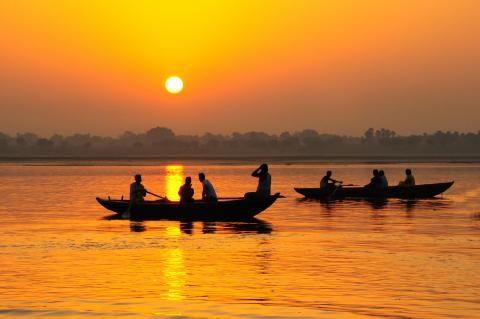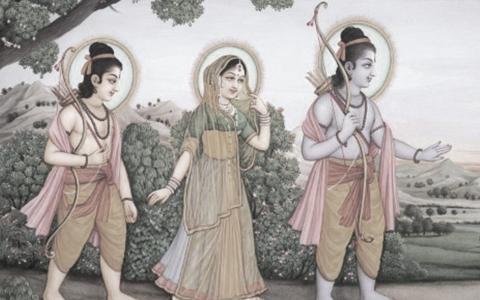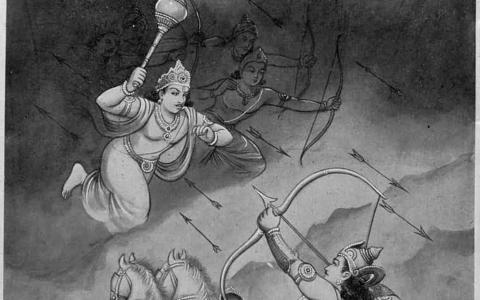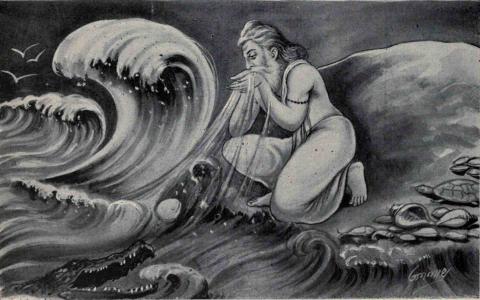
The couple gathered fruits and put them together in a bundle. As Satyavān was working on the logs, his body began sweating all over. He had a tremendous headache. He immediately stopped his work, went to Sāvitrī, and said, “Sāvitrī! My limbs, head, and the entire body is aching. There is some pain in my chest too. I feels like a spear has pierced my head. I don’t seem to be keeping well. I'm not able to stand on my feet and feel like lying down...

In the kingdom of Madra, there lived a king named Aśvapati who always abided by dharma and truth and was loved by everyone. He did not have any children even though he grew old. With a desire to obtain offspring, he undertook many rigorous vows and vratas. He would lead a life of self-restraint, eating little, and performing ten thousand homas daily in praise of goddess Sāvitrī. After eighteen years of strictly adhering to this ritual, one day...

Just as Śani approaches Rohiṇī for pleasure, Rāvaṇa decked himself up in expensive clothes and ornaments and went to Sītā. He described his achievements and wealth to her and persuaded her to be his wife. She, however, held a blade of grass before her and spoke to it with tears in her eyes, “I’ve heard these words several times from you already. I’m the wife of another and I’m committed to my husband alone. I’m a pativratā. Give up your thoughts...

Worried that the citizens of Ayodhya may yet again come to the forest, Rāma left the great forest, went to the banks of the beautiful Godāvarī river, and began residing near the āśrama of Sage Śarabhaṅga. Owing to Śūrpaṇakha, Rāma makes an enemy out of Khara, who was residing at Janasthāna. Rāma killed Khara, Dūṣaṇa, and thousands of other rākṣasas, thus making that dhārmic forest safe for everyone. Śūrpaṇakha, with her lips and nose chopped off...

There was a great king named Aja in the Ikṣvāku dynasty. Daśaratha was his son. He had four sons who were all experts in dharma – Rāma, Lakṣmaṇa, Bharata, and Śatrughna. Rāma’s mother was Kausalyā; Bharata’s mother was Kaikeyi; Lakṣmaṇa- Śatrughna’s mother was Sumitrā. Janaka, the king of Videha, had a daughter named Sītā. Tvaṣṭṛ (Brahmā) himself created her to become the beloved queen of Rāma.
The creator of all the worlds and the self-existing...

Sometime after this episode[1], Duryodhana felt that he too should perform a grand yajña like Dharmarāja. Upon learning of this, Karṇa said, “Indeed! This can take place. Now, all kings have been brought under your control; we shall call the ṛtviks and start the preparations for conducting the yajña! Nothing else remains.” When the purohita was called, he said, “Mahārāja! Yudhiṣṭhira is still alive; your father is aged. Therefore, you conducting...

The entourage[1] that left from Hastināpura to Dvaitavana camped at a place near the villages of the cowherds. They set their tents up making sure that there was ample supply of water and shade, choosing land that was smooth and flat. They took a count of the cattle. Men and women of the village wore different costumes and entertained the guests with music and dance. Duryodhana rewarded them with a bounty of food and money. The entourage then...

The sage Mārkaṇḍeya narrated several traditional stories to the Pāṇḍavas during their stay in Dvaitavana. The story of Dharma-vyādha is one among those.
There lived a brāhmaṇa by name Kauṣika. He was well-versed in the Vedas, of noble character, and a tapasvi. Once, when he was reciting the Vedas under a tree, a balāka bird excreted upon him. The brāhmaṇa was enraged and looked at it with eyes filled with anger. The bird lost its life the next...
One day, the northeast winds brought along with a divine Saugandhika flower.[1] Deeming this to be an auspicious omen, Draupadī picked up the flower, went to Bhīma, and said, “Bhīmasena! Did you see how beautiful this flower is! I shall go and give this to Dharmarāja. Bring me many more of such flowers; let us take it to the Kāmyaka forest!” According to her wishes, Bhīma set out, armed with his weapons, following the fragrance in the wind, and...

The Pāṇḍavas longed for the company of Arjuna and were getting bored without him[1]; they set out on a tīrthayātra (pilgrimage) with the intention of acquiring puṇya and also to get rid of the boredom.[2] They reached Naimiṣāraṇya, took a dip in the river Gomatī, and travelled around several famous and sacred spots. They finally reached the āśrama of Agastya. There Lomaṣā narrated the story and greatness of Agastya to them.
Agastya married...
